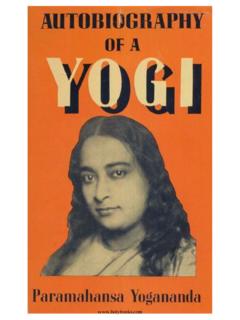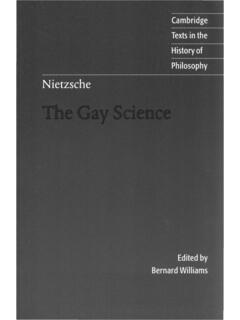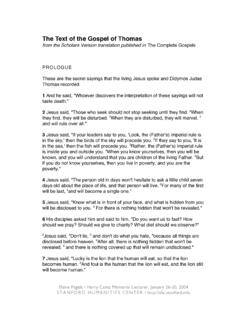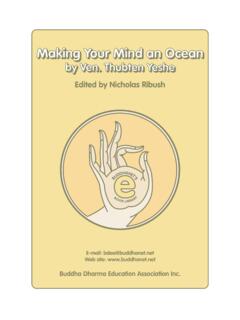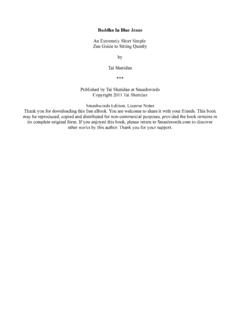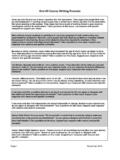Transcription of Katha Upanishad - holybooks.com
1 Katha UpanishadThe Katha Upanishad is probably the most widely known of all the upanishads . It wasearly translated into Persian and through this rendering first made its way into Raja Ram Mohun Roy brought out an English version. It has since appeared invarious languages; and English, German and French writers are all agreed in pronouncing it one of the most perfect expressions of the religion and philosophy of the Vedas. SirEdwin Arnold popularized it by his metrical rendering under the name of The Secret ofDeath, and ralph waldo emerson gives its story in brief at the close of his essay on Immortality. There is no consensus of opinion regarding the place of this Upanishad in Vedic authorities declare it to belong to the Yajur Veda, others to the Sama Veda, while a large number put it down as a part of the Atharva Veda.
2 The story is first suggested in the Rig Veda; it is told more definitely in the Yajur Veda; and in the Katha Upanishad itappears fully elaborated and interwoven with the loftiest Vedic teaching. There is nothinghowever, to indicate the special place of this final version, nor has any meaning beenfound for the name text presents a dialogue between an aspiring disciple, Nachiketas, and the Ruler ofDeath regarding the great UpanishadPeace ChantMay He (the Supreme Being) protect us both, teacher and taught. May He be pleased with us. May we acquire strength. May our study bring us illumination. May there be no enmity among ! PEACE! PEACE! PEACE!Part FirstIVahasrava, being desirous of heavenly rewards (at the Viswajit sacrifice), made a gift of all that he possessed.
3 He had a son by the name of the offerings were being distributed, faith (Shraddha) entered (the heartof)Nachiketas, who, though young, yet resected:IIIT hese cows have drunk water, eaten grass and given milk for the last time, and theirsenses have lost all vigour. He who gives these undoubtedly goes to joyless India the idea of sacrifice has always been to give freely for the joy of giving, withoutasking anything in return; and the whole purpose and merit of the sacrifice is lost, if thegiver entertains the least thought of name, fame or individual benefit. The special Viswajitsacrifice which Vajasrava was making required of him to give away all that he , however, the gifts were brought forward to be offered, his son Nachiketas, althoughprobably a lad about twelve years of age, observed how worthless were the animals which his father was offering.
4 His heart at once became filled with Shraddha. There is no oneEnglish word which can convey the meaning of this Sanskrit term. It is more than merefaith. It also implies self reliance, an independent sense of right and wrong, and thecourage of one s own conviction. As a boy of tender age, Nachiketas had no right toquestion his father s action; yet, impelled by the sudden awakening of his higher nature, he could not but reflect: By merely giving these useless cows, my father cannot gain anymerit. If he has vowed to give all his possessions, then he must also give me. Otherwisehis sacrifice will not be complete and fruitful. Therefore, anxious for his father s welfare,he approached him gently and said to his father: Dear father, to whom wilt thou give me?
5 He said it a second time,then a third time. The father replied: I shall give thee unto , being a dutiful son and eager to atone for his father s inadequate sacrifice,tried to remind him thus indirectly that he had not fulfilled his promise to give away all hispossessions, since he had not yet offered his own son, who would be a worthier gift thanuseless cattle. His father, conscious that he was not making a true sacrifice, tried to ignore the boy s questions; but irritated by his persistence, he at last impatiently made answer: Igive thee to Yama, the Lord of Death. The fact that anger could so quickly rise in his heart proved that he had not the proper attitude of a sacrificer, who must always be tranquil,uplifted and free from thought: Among many (of my father s pupils) I stand first; among many (others) I stand in the middle (but never last).
6 What will be accomplished for my father by my going this day to Yama?It was not conceit which led Nachiketas to consider his own standing and importance. Hewas weighing his value as a son and pupil in order to be able to judge whether or not hehad merit enough to prove a worthy gift. Although he realized that his father s harsh replywas only the expression of a momentary outburst of anger; yet he believed that greaterharm might befall his father, if his word was not kept. Therefore he sought to strengthenhis father s resolution by reminding him of the transitory condition of life. He said:VILook back to those who lived before and look to those who live now. Like grain the mortaldecays and like grain again springs up (is reborn).
7 All things perish, Truth alone remains. Why then fear to sacrifice me also; Thus Nachiketas convinced his father that he should remain true to his word and send him to Yama, theRuler of Death. Then Nachiketas went to the abode of Death, but Yama was absent andthe boy waited without food or drink for three Yama s return one of his household said to him:VIILike fire a Brahmana guest enters into houses. That fire is quenched by an offering.(Therefore) O Vaivaswata, bring foolish man in whose house a Brahmana guest remains without food, all his hopesand expectations, all the merit gained by his association with the holy, by his good wordsand deeds, all his sons and cattle, are to the ancient Vedic ideal a guest is therepresentative of God and should bereceived with due reverence and honor.
8 Especially is this the case with a Brahmana or aSannyasin whose life is wholly consecrated to God. Any one who fails to give proper careto a holy guest brings misfortune on himself and his household. When Yama returned,therefore, one of the members of his household anxiously informed him of Nachiketas presence and begged him to bring water to wash his feet, this being always the firstservice to an arriving said: O Brahmana! Revered guest! My salutations to thee. As thou hast remainedthree nights in my house without food, therefore choose three boons, O said: May Gautama, my father, be free from anxious thought (about me). Mayhe lose all anger (towards me) and be pacified in heart.
9 May he know and welcome mewhen I am sent back by thee. This, O Death, is the first of the three boons I replied: Through my will Auddalaki Aruni (thy father) will know thee, and be againtowards thee as before. He will sleep in peace at night. He will be free from wrath when he sees thee released from the mouth of said: In the realm of heaven there is no fear, thou (Death) art not there; nor isthere fear of old age. Having crossed beyond both hunger and thirst and being above grief,(they) rejoice in knowest, O Death, the fire sacrifice that leads to heaven. Tell this to me, who am full of Shraddha (faith and yearning). They who live in the realm of heaven enjoy freedom from death. This I beg as my second replied: I know well that fire which leads to the realm of heaven.
10 I shall tell it to to me. Know, O Nachiketas, that this is the means of attaining endless worlds andtheir support. It is hidden in the heart of all then told him that fire sacrifice, the beginning of all the worlds; what bricks, howmany and how laid for the altar. Nachiketas repeated all as it was told to him. Then Death, being pleased with him, again said:XVIThe great soured Yama, being well pleased, said to him (Nachiketas): I give thee nowanother boon. This fire (sacrifice) shall be named after thee. Take also this garland ofmany who performs this Nachiketa fire sacrifice three times, being united with the three(mother, father and teacher), and who fulfills the three fold duty (study of the Vedas,sacrifice and alms giving) crosses over birth and death.
